Quad-Cities’ WVIK Veterans Recall Highlights of Public Radio as NPR Turns 50
Saturday in the Arts is a weekly feature covering a trend, subject, event or personality of local interest. It runs every Saturday morning on  your site for the best entertainment and arts coverage in the area, QuadCities.com!
your site for the best entertainment and arts coverage in the area, QuadCities.com!
If it wasn’t for a man who later became WQPT-TV general manager, National Public Radio (NPR) likely would never have started. This past week, NPR celebrated its 50th anniversary.
Jerrold Sandler — who died in Moline Feb. 24, 1995 at age 64, from a heart attack after cancer surgery – got public radio added to the mission of the then-new Corporation for Public Broadcasting (CPB) in the late ‘60s, said Don Wooten, founder of WVIK, the Quad-Cities NPR station.
In 1967, President Lyndon B. Johnson articulated the mission of the CPB, a nonprofit corporation funded by American taxpayers. Originally named the Public Television Act, the bill’s purpose was to fix TV’s problems.
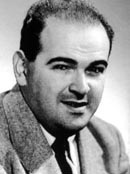
Jerrold Sandler helped usher in NPR and later was manager of WQPT in Moline.
“TV needed federal help, they proposed a bill for National Educational Television, and Sandler thought we were overlooking radio,” Wooten, 92, said this past week at the WVIK studios in Rock Island. “He commissioned William Land to do a report on radio and Fred Friendly paid for it.”
“The idea was to include radio in the public television bill and thanks to Sandler, it got in,” Wooten said. “He showed up later in the ‘90s as manager of WQPT-TV.”
“Jerry was probably the key guy to make sure that radio was included in the Public Broadcasting Act,” historian John Witherspoon said in a history of the time at current.org. At the time when the National Association of Educational Broadcasters (NAEB) was building its movement to obtain federal aid, in the ’60s, Sandler came to Washington as director of NAEB’s radio division.
Fred Friendly was the former CBS newsman who was public TV’s angel at the Ford Foundation.

National Public Radio first went on the air May 3, 1971.
“As we looked at the scene, with all the attention going to television, we realized we had to do something to dramatize the cause of radio,” said Herman W. Land, then a New York consultant. Sandler hired Land to put together a quick report, The Hidden Medium and persuaded Friendly to pay for it.
Sandler, Land and colleagues presented their report to the Senate communications subcommittee during its eight days of hearings on the funding bill. It was amended to include radio and was signed by President Johnson in November 1967.
After Sandler’s work on the Public Broadcasting Act, he moved on to the Smithsonian Institution in 1968 as the first director of the national “Reading Is Fundamental” program, which distributed books to inner-city and rural children.
In the 1970s and ’80s, Sandler did consulting work for the National Council on the Aging, the Ford Foundation and other clients, and worked at the National Institute on Education. In 1976-79, he was executive producer of “Footsteps,” a 30-part public TV series on parenting.
Sandler returned to universities as a visiting lecturer at San Diego State University in 1981, as director of television services at Northern Arizona University in 1982, and as GM of WQPT-TV in Moline, in 1990 (then based at Black Hawk College). He retired in 1992.
“He was a nice guy; he’d been in the field for a long time,” Wooten, who also served on the WQPT board, said. “Television is expensive – the electric bills alone are overwhelming. I kind of wondered how it could keep going.”
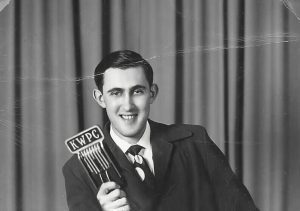
Wooten started his broadcasting career in 1950 in Muscatine.
According to On the Media host Brooke Gladstone, there wasn’t much, if any, news happening in radio at the time of National Public Radio’s debut May 3, 1971.
“NPR was able to walk into an open field and start playing,” she said in a 50th anniversary piece at NPR.org. “That was one of the reasons it was able to set the rules of the game, the sound of the air.”
Bill Siemering, NPR’s first director of programming, recognized the lack of structure as something exciting. “I remember, maybe at the first staff program — staff meeting — I said ‘We have a blank canvas here, and there’ll be thousands of brush strokes on this,’ “ he recalled in the NPR piece.
“But the very first brush strokes that we put on this are very important because that will set a tone and value,” Siemering said. He wrote the first paragraph of what would become NPR’s mission statement:
“National Public Radio will serve the individual. It will promote personal growth. It will regard individual differences with respect and joy

WVIK broadcasts at 90.3 FM in the Q-C, 95.9 in Dubuque and a separate HD2 frequency at 105.7 FM.
rather than derision and hate. It will celebrate the human experience as infinitely varied rather than vacuous and banal. It will encourage a sense of active, constructive participation, rather than apathetic helplessness.”
“50 years later, we fill a digital space that goes beyond the wildest dreams of our founders,” NPR wrote in its 50-year celebration. “I’ve never thought of it as something that was exclusively radio,” NPR’s vice president of programming, Anya Grundmann, said. “It’s about creating experiences that will enhance people’s lives.”
NPR serves on every platform imaginable. Every week, 60 million people consume some form of NPR across a full range of experiences, including radio, smart speakers, NPR.org, video streaming, live events, mobile apps and podcasts.
NPR says it’s been one of the top publishers in the U.S. since podcasting began. In fact, in January 2000, NPR created an online show that didn’t exist on the radio at all: “All Songs Considered” — the first podcast before the term even existed.
Today, NPR publishes more than a dozen podcasts every week and partners with stations and independent producers as well. In fact, one-third of all daily podcast listening is attributed to NPR and its 1,000-plus member stations.
Launching WVIK at Augustana
When NPR started in 1971, Don Wooten was doing public affairs programming at WHBF-TV and preparing to run in the 1972 Illinois State Senate race. He worked at WHBF for 19 and a half years, until the end of ’71.
A St. Ambrose University alum, his first full-time job was announcer for KWPC in Muscatine, Iowa in 1950. In 1952, he began his association
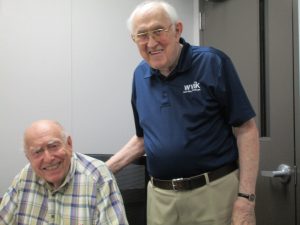
Don Wooten, right, and Roald Tweet at WVIK.
with WHBF, serving the station as announcer, producer, weatherman, and director of public affairs. He won nine statewide awards for his “Spectrum” series, initiated the popular “At Issue” program, and was the only non-print journalist to be named to the Illinois State Medical Society’s “Journalism Hall of Fame.”
During those years, Wooten also helped edit the Catholic Messenger for the Davenport Catholic diocese, wrote music reviews for several newspapers and Commonweal magazine, taught six periods a day at Alleman High School in Rock Island (including English, Humanities, and chorus), and founded the Genesius Guild – free, classic theater, ballet and opera performed during the summer in Rock Island’s Lincoln Park.
Wooten won two terms in the Illinois State Senate; he served 1977-1980 as chairman of the senate executive committee and was honored with 17 “best legislator” awards. Then he returned to his roots, combining his experience in broadcasting with his love for the arts.
He wanted to start the public radio station originally to promote classical music.
“I’m a great fan of classical music. I was on the Symphony board, and I figured the way radio developed – when I was a kid, almost every radio station played some classical music,” Wooten said recently. “Once we got into the modern era, with the multiplication of networks and
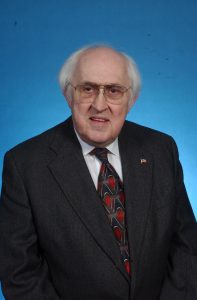
Wooten served in the Illinois State Senate in the 1970s.
stations, we’re now in narrowcasting – a station will pick one format and do it: all news, all rock, all country, all pop.”
“I figured there’s got to be classical music in this mix,” he said, noting he’d been a classical record reviewer for a long time, through the Davenport Catholic Messenger.
“I was deluged with classical LPs,” Wooten said of companies sending him free records. “I thought, someday I’ll have a classical radio station, I can use these LPs.”
“Classical music, there’s a complexity and a beauty to it that nothing else can equal,” he said, noting he doesn’t play an instrument. “I have no motor skills.”
When he started WVIK on the Augustana campus, Wooten moved in 5,000 records into his new library at the station. The student station had been founded 18 years prior, and after WVIK, the students got a small frequency of their own for campus, WAUG.
In 1977, Wooten said he wanted to take the student 10-watt station (named WVIK after the school mascot, the Vikings), “and turn it into a honking big public radio station,” he recalled. Wooten called up the president of Augustana, who told him if you could find a way to do it, to do it.
“It took me three years to get it figured out,” he said. “The college wondered about it. I got a grant from the Corporation for Public Broadcasting, about $5,000 a year, for a couple of years, when I ran into one problem after another.”
Wooten said WVIK originally agreed to swap frequencies with SAU’s station (KALA) – 88.5 FM for 90.1 FM for VIK. “I sat there thinking, you’re making a mistake, but I’m so glad you’re making this mistake. Their interests remained in television, though in subsequent years they paid more attention to radio and today have a pretty good operation going.”
Later on, 90.3 FM turned out to be a better frequency, Wooten said, noting they had more power to transmit.
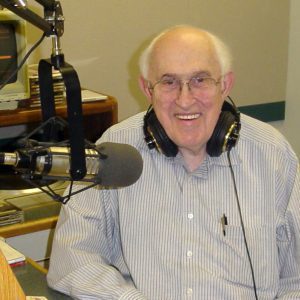
Don Wooten (now 92) founded WVIK, which first aired Aug. 25, 1980 and he’s hosted programs to this day.
The station was originally in the student union, on the second floor of the biology building (later torn down), and the current station – the Doris and Victor Day Broadcast Center — was built in 1996.
WVIK first went on the air Aug. 25, 1980 (the first piece of music that morning was Johannes Brahms’ “Academic Festival Overture”), and Wooten said it was a coincidence (“Believe me!”), he found out later that Aug. 25 is the Feast Day of Saint Genesius.
Wooten founded the Rock Island-based Genesius Guild in 1956 (which continues to this day), named for the 3rd-century patron saint of actors, lawyers, clowns, comedians, and dancers.
“The role of the station is to extend Augustana’s mission into the community,” he recalled telling then college president Thomas Tredway. “It was Cardinal Henry Newman who said the failing of a great university is it’s unable to intellectualize the neighborhood. We can do that – we can do that with a radio station, and now it’s pretty solidly established.”
The WVIK vision statement says:
“Content is presented on-air and online with integrity and authenticity, and in an even, non-confrontational tone favored by our curious, well-educated, socially aware and involved constituents. Through our programs and partnerships, we contribute significantly to the civic and cultural health of our community.
“Moreover, we add to the economic vitality of businesses wishing to engage with a highly desirable demographic by providing financial support for programs they value. It is through impactful programming, meaningful partnerships and strong development initiatives
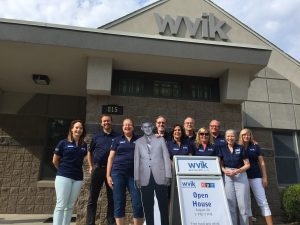
The WVIK staff at its Rock Island station on 38th Street in 2017.
that WVIK remains a financially independent, essential asset in our community.”
“We didn’t hold a fund drive for six months; we had to prove ourselves first,” Wooten said of the station. “I had a gangbusters staff. Every voice was just right. They spoke beautifully; they knew what they were doing, and after six months we had our first fund drive and hit our goal right away. I thought this was a going concern.”
The Quad-Cities had been one of the last areas of Iowa and Illinois without a city-grade signal from an NPR station. Prior to 1980, the only source of NPR programming in the area had been a low-powered translator of Cedar Falls‘ KUNI, though much of the area got some coverage from Iowa City‘s WSUI. In 1991, it moved to its current frequency, and activated its Dubuque translator (95.9 FM) in 1996.
Wooten retired as manager in January 2003 when his wife Bernadette became quite ill (she died in 2011). Lowell Dorman, who had been program director, became GM when Wooten left.
“When we opened, engineers from other stations came to see this station, because we at that moment, had state-of-the-art in everything,” he said of the current station at 815 38th St., Rock Island. The property and equipment are owned by Augustana, but the private college doesn’t fund WVIK operations (though it does some back-office, administrative functions).
“It’s important when you’re a public radio station, to serve the public in the best way it can be served,” Wooten said. He wanted to continue on air after retiring “because I didn’t know what else to do,” he said.
“I’ve always had this problem – anything I start I think is worthwhile, I can’t stop,” Wooten said. “The shows have always had a solid audience, so I didn’t know how to stop. And then, if you have nothing to do, even as you get as old as I am, life can be kind of dull.”
“Having something to do on Saturdays, that is perfect for a former general manager,” he said. “I come in on Saturday and no one else is here. I have no impact on the staff. I thought that was a really good idea.”
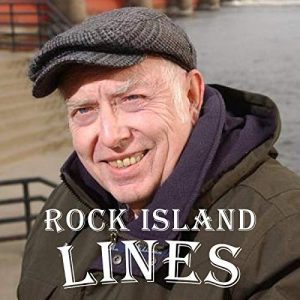
Roald Tweet, longtime host of “Rock Island Lines,” died last November at 87.
“As long as people listen, I’ll show up,” he said. “Our Saturday lineup plays pretty well.”
After retiring as GM, Wooten continued to serve WVIK as host of Matinee – from the light classics to lyric theater — over the noon hour (through 2011), Saturday Morning Live (at 10 a.m.), Swing Shift (9 p.m. Saturdays), Jazz After Hours (10 p.m. Saturdays), and co-host of Scribble (Saturdays at noon).
In addition, he writes weekly columns for the Dispatch and Rock Island Argus, is a guest lecturer, and has served as a board member for a number of local, state and regional arts organizations.
Wooten pre-records “Scribble” (a writing-themed show), which airs Saturdays at noon, and was long co-hosted by Roald Tweet. The retired Augie English professor and “Rock Island Lines” host died last November at 87, and at the time of his death, the pair had recorded three unaired episodes. Since March 2020, WVIK has aired mainly repeats of the show.
“Because of the pandemic, it was either cancel the show or do recorded programs,” Wooten said. Professor Rebecca Wee is the new co-host, and their first episode airs today, May 8. She joined the Augie English department in 1994, teaching poetry, literature, first-year writing, and directs independent studies in creative writing.
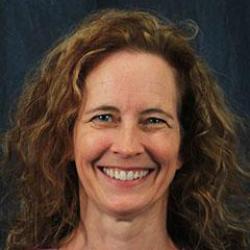
Augustana English professor Rebecca Wee is the new co-host of “Scribble,” Saturdays at noon.
In 2003, U.S. Poet Laureate Billy Collins awarded her a Witter Bynner fellowship in poetry from the Library of Congress, and from 2003-2005 Wee served as the second poet laureate of the Quad-Cities.
“It’s tough, because we can only talk to people who are fully vaccinated and under conditions where we have clear separation,” Wooten said of interviewing guests in the studio, separated by a room or dividers within a room.
“The station keeps very close control over things,” he said of dealing with Covid. “We limit the number of people in the station. You have to be careful, and the problem is the country hasn’t been careful. It’s so infuriating – this could have been stopped in two months. Instead, it lingers and now it’s gonna be with us forever.”
Public radio is important to be a source of trusted national news, in the way the traditional TV networks used to serve, Wooten said. “This is the only local radio station with a new staff; it’s come to that. NPR works so hard – they’re constantly accused of bias.”
“People are so suspicious anymore,” he said, noting President Reagan instilled distrust in government among the public, which extends to other institutions.
“NPR does a really good job of going down the middle,” Wooten said of the right-left political spectrum. “What do you do if someone is telling
you a lie, that the vote was stolen? Not only is it not true, it’s not possible. It would take a huge, thousands and thousands of Democrats and Republicans across the country, involved in the voting process, to agree somehow we’re going to corrupt this.”
His proudest accomplishment for WVIK is that it’s still here.
“I started the Genesius Guild on an impulse and I started this station on an impulse,” Wooten said. “The thought that it will always be what I had in mind is arrogant. You can’t control anything from the grave.”
“I hope with all my heart that classical music stays at the heart of WVIK,” he said.
Wooten said general manager Jay Pearce (who began in 2011) is excellent and has “made tremendous strides forward with the station.”
The following are recollections from some other key WVIK staff over the years:
Jay Pearce, GM
Pearce grew up in the Chicago suburb of Winnetka and earned his bachelor’s degree in communications and fine arts from Southern Illinois University (SIU) in Carbondale.
His affiliation with NPR began as a student at SIU in 1975 when he was a volunteer for public radio station WSIU in Carbondale. He literally first heard NPR in 1974, when he was in school at University of Illinois in Chicago and assigned by a class to listen to “All Things Considered.”
“I was a guy who listened to all of the fledgling underground rock stations at the time, so I turned way down the left side of the dial and found
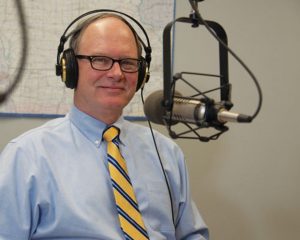
Jay Pearce became GM of WVIK in October 2011.
WBEZ Chicago,” Pearce said recently, noting he was blown away. “I’d never heard anything like that.” “It was that they were telling stories was way different than typical news, and I could tell from the from the things that they were covering and the things I was learning on the show that I wasn’t getting anywhere else,” he said. “It was impactful and I thought, wow, that’s a way to really make a difference, to really have an impact.”
WVIK is among over 1,000 NPR member stations in the U.S. — independent, locally owned and operated broadcasters. “In an era of media consolidation and corporate ownership, these local stations are becoming an increasingly rare and even more vital source of local news and information for the communities they serve,” according to NPR.
About two-thirds of stations are licensed to, or are affiliated with, colleges or universities, like WVIK. The remaining third are governed by community-based boards. Some stations are operated jointly with public TV stations.
Each member station determines its own format and schedule. In creating their broadcast schedule, they may choose to select from NPR programs such as “Morning Edition,” “All Things Considered” or “Wait Wait…Don’t Tell Me!”; pick up programs distributed by other public radio producers, stations or networks; and/or create their own local programming. Stations create their schedules based on the interests and needs of their local audience.
WVIK pays about $100,000 a year to be an NPR member and pay for its programming.
Pearce became the station’s general manager Oct. 3, 2011, and more than half of his career in broadcasting has been in public broadcasting.
He’s worked at radio and television stations up and down Illinois as well as in Missouri and Texas. Additionally, he taught broadcasting journalism at SIU and University of Illinois.
Pearce serves on several boards — including the Quad Cities Illinois Rotary Club; ONE Foundation, Bettendorf; Illinois News Broadcasters Association Foundation; and Illinois Associated Press Broadcasters Association. His wife, Melisse Trentz, is a Moline native whose ancestors
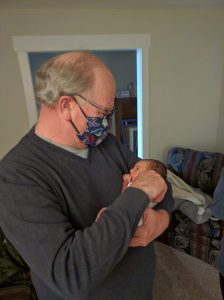
Pearce, 66, with his grandson Jay.
were some of Mercer County’s early residents.
“Augustana College just impressed me, the attitude, the vibe,” Pearce said in 2011 upon being hired by WVIK. “It had me. I was just so impressed with the place, I fell in love. It just seems like a good fit. I have definite strengths in public radio programming and fundraising. The primary job of a general manager is to steer the course of the station. A manager needs to be out in the community, to make sure everyone knows the story of WVIK, and why they should support it.”
In October 2019, WVIK launched its second, HD2 frequency, but that doesn’t mean “high definition” — rather “hybrid digital.” It’s available to be streamed on wvik.org, through smart speakers and the station mobile app. A translator enables broadcast in low-power format at 105.7 FM.
“It’s almost surreal how quickly it came together,” Pearce said in 2019 of buying the license from a Dallas-based owner. “This is a calculated risk we hope will pay off, with additional listeners, business and corporate sponsors, and donors.”
In recent years, the station listenership plateaued — averaging about 19,000 per week, so Pearce wanted to diversify and expand its programming to boost its bottom line, as well as serve its mission to provide first-class news, information, and cultural programming for the region.
About seven years ago, WVIK spent about $500,000 to upgrade its equipment; exceeded its year-end fundraising goal, and borrowed from reserves to get the new frequency off the ground, with its attendant 24-hour programming, Pearce said.
The new programs available at the second station include BBC News overnight on weeknights, “Fresh Air,” “Here & Now,” “1A” (with Joshua Johnson), and “The 21st,” an Illinois-centric show produced by Illinois Public Media.
Since the pandemic, the station hasn’t really been able to beef up and promote 105.7 FM and Pearce said it’s one of his priorities to fill it out

Marianna Bacallao is the WVIK newsroom fellow and does morning local news.
more, and give it a more local flavor. In the past 50 years, there’s been so much national consolidation and reduction of media outlets, often local news coverage suffers, he said.
“You look at what your city governments, county governments are doing, and you can see that if it’s hard to figure out the truth about things and what is happening and if you’ve got a lot of people in the dark and so we’re surprised – like, oh where did that tax increase come from?” Pearce said. “Well, we’ve been talking about it on the air.”
“If there’s no media here to tell you about it, to analyze it, to try to put it in perspective for you — to find out the truth about it, do you know what’s going on?” he said. “So it becomes very easy for you to be influenced.”
For example, that leads to many people believing the 2020 election was “stolen,” Pearce said. “How many judges, election officials, courts have to throw this out for lack of evidence or for lack of a case?” he asked. “I don’t think could happen in 1975. You had a lot more watchdogs, a lot more people, legitimate news sources reporting it back in that time.
“That’s just that’s why it’s important. That’s why the legitimate news media is important,” Pearce said. “I don’t get up at 3 in the morning and conspire with all of the other radio stations and networks and whatever else in the country to come up with the story or the narrative of the day.”
NPR is considered a news source of record, and doesn’t deserve claims of liberal bias, he said. About 60 million people listen to, watch, or read NPR news content each week, Pearce said. “And that’s huge.”
WVIK annually has a newsroom fellow, who hosts local segments during Morning Edition, and this year that’s been Marianna Bacallao, a position supported by the Quad Cities Community Foundation that expires at the end of June. She graduated Magna Cum Laude from Mercer University’s Center for Collaborative Journalism.
“I’m working very hard, because it is trying financial times, but I’m working to get approval from the college to put some of our money into a Morning Edition host,” Pearce said, noting he personally filled that role previously in recent years.
“I would love for us, when her fellowship is done, to continue that as a full-time position,” he said. “We get a lot of good comments about how
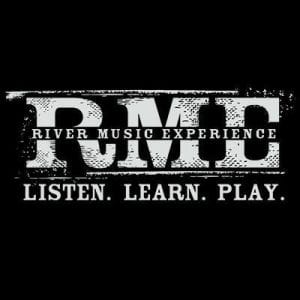
River Music Experience worked with WVIK to begin the RME Radio Hour on Saturday nights.
she’s doing. I think she sounds really good too. My dream would be to get approval from the college to offer the job. I would like Marianna to continue it.”
Pearce has served on the River Music Experience board for about six years, including two years as chair, and worked with the late Ellis Kell to start RME Radio Hour on WVIK Saturday nights seven years ago (it now airs at 5 p.m.). Bret Dale has hosted it since Kell died in December 2016. Over 50 years, NPR has become more mainstream, “as it’s taken over the mantle of a dependable news network, national and international bureaus,” Pearce – who’s served on the NPR board of directors since 2016 — said.
“It uses the resources of member stations throughout the country to cover areas nobody else has a reporter in. It really has grown, and the expertise has grown.”
“Diversity always has been better at NPR stations than most,” he said. “It’s the number-one priority, I can tell you as a board member. Diversity, equity and inclusion – that’s the buzzword as we go through this year.”
“NPR has always sounded more like the nation than your stereotypical radio announcer, news announcer,” Pearce said. “People talk in their natural voices.”
A challenge for smaller stations like WVIK is that the talent pool isn’t very diverse, he said. “There are a lot of stories that need to be told that aren’t ours to tell. We don’t have the perspective; we don’t live it.”
That’s why WVIK started the “Hidden Conversations” series, hosted by LaDrina Wilson, to tell stories of minority communities “with authority and authenticity,” Pearce said. “We’ve been doing that.”

The next “Hidden Conversations” will be at 6 p.m. May 13 on Facebook Live.
The NPR board includes 12 public-radio station managers (including Iowa Public Radio’s), and his membership will expire in fall 2022. Pearce plans to retire from WVIK at the end of that year (at age 68), after 49 years in broadcasting.
“I have several projects to wrap up at WVIK and then it will be time for me to travel with my wife, to garden, and play with my grandchildren,” he said, noting one is now 3 months old and one is 4 months.
The last in-person NPR meeting he attended in Washington was in February 2020; they meet quarterly. “It’s very interesting,” Pearce said. “It’s kind of like for a guy like me, an NPR junkie, I’m a little starstruck sometimes getting to hang out with people like Steve Inskeep. It’s fun, but it’s also a lot of work.”
Other big goals before retiring — beyond building out 105.7 FM — are to start a full-time arts desk and media camps for students of color and those who are financially challenged. That will help stations like WVIK to diversify those on-air voices, Pearce said.
“They’ll hire someone to succeed me who’ll be just fine, but I think there are some unique things about WVIK that we’ve built up over the years,” he said, noting it’s overlapped by the much better resourced Iowa Public Radio (heard in the Q-C at KUNI, 94.5 FM).
“We are able to hold our own because we’re very high on community engagement,” Pearce said. “We live in the community, we care about the same things our listeners do.”
“It’s all these different things we do in the community,” he said of working with other local nonprofits. “We have a responsibility – the community supports us and so we give back to the community. We’re always trying to figure out what it is the community needs.”
“That’s what public radio stations across the country do,” Pearce said. “We pick and choose the programs based on what the community needs and we keep in touch with our community to do that.”
Commercial radio has been focused on ratings, to get the most amount of money possible for commercials, to return a profit margin as big as possible. “There are very few local people left at local radio stations,” Pearce said. “A lot of it is driven from out of town, regional managers.”
He added that despite Tweet’s passing, WVIK will continue running the three-minute “Rock Island Lines” (weekdays at 11 a.m.), adding to its catalog of classic repertoire.
“There’s hundreds of them,” Pearce said. “You think about it, at any given time the majority of our overall listeners are not listening, so it’s always new to somebody. We’ll just run those forever. That’s just such an institution that people like to hear them again.”
Mindy Heusel, afternoon “Perspective” host
Heusel, a 39-year station veteran, is the most senior staffer next to Wooten. A native of Hooper, Neb., she was primed for a career as a classical music announcer, since she started studying piano at age 3, and flute from sixth grade, and was a frequent piano accompanist.
Heusel started at WVIK on the evening shift, one night a week, while still a student at Augustana College, where she transferred after
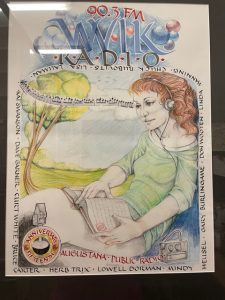
Bill Hannan’s portrait of WVIK’s Mindy Heusel, who hosts “Perspective.”
attending school in Nebraska.
When she started in 1982, she had to pass a three-page musical pronunciation test from Wooten, a demanding perfectionist. “It was composers, musical terminology. Yeah, it was brutal,” Heusel said this week. She began working nights when the station signed off at midnight, and used reel-to-reel tape.
“We signed off and there was a very elaborate process that you had to go through to basically turn the station off. You’d turn the transmitter off; the transmitter link had to come down and you had to log everything,” she recalled. “In those days, the FCC was just a stickler, you had to log everything.”
WVIK expanded to 24 hours a day in 1983, Heusel said, and she worked the midnight to 7 a.m. shift (six nights a week) for two and a half years.
“I was always a night person, so I loved it,” she said. “I thought this was an ‘a-ha’ moment that I could take to my parents and go — you told me I’d never get a job where I could stay up all night. And look, I got one, but it wore me down pretty quickly. I was surprised and I was really young then and it didn’t take long before I was just physically exhausted.”
“My doctor had recommended that I take a different job and I was just heartbroken because I thought I loved this place. The first time I walked into that ugly old music library, I just felt like I had my personal epiphany, like that was the light shining down showing me, this is where you need to be. I had never seen a music library quite like that before.”
In 1985, she moved to days and began her long tenure as host of “Perspective,” WVIK’s afternoon classical music program (switching from 1 to 5 p.m., to noon-4 p.m. after 2011). Under Heusel’s direction, the program has developed into exploring new music from living composers, not just from orchestra halls but including Broadway and film music.
Since 1985, the general public’s listening habits have changed dramatically, she said.
“The biggest difference is that you don’t have as long a time with what we call the time spent listening,” Heusel said. “Back in those days when people tuned off, they had a tendency to stay with you throughout your shift. If you had somebody that joined you at 1, the chances were they were going to listen on and off until your show ended and then it would go into ‘All Things Considered.’
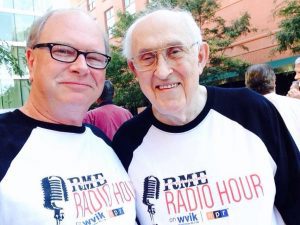
Jay Pearce, left, and Don Wooten at River Music Experience, Davenport.
“People just don’t listen that way today,” she said. “I would say very few people that start with me at 12:10 are still with me at 4 when I wrap it up. I probably have an audience turnover every 20 to 30 minutes. Nowadays people just don’t have that time, you know, they’re busy.”
Heusel served as operations manager at WVIK from 1985 until 1988, and membership manager from 1992 to 1995, running fund drives and processing the all-important listener contributions to WVIK. For the past two decades, she’s also served as music director, keeping the library up-to-date and organized for WVIK’s classical programmers.
After the new station was built, “It was nice to have a brand new building,” Heusel said. “And the building actually had soundproofing and it was a building that had actually been designed to run a radio station. In fact, there wasn’t bleeding through from other studios of sound and noise. Everything was soundproofed because this was built to be a radio station. One of the features that I really love is when you sit here in master control, you have a bird’s-eye view into the four auxiliary studios.”
“There were a lot of people my age, who were not listening to WVIK, unless you were a music student there,” she said of the perennial older demographic. “People my age were into rock and roll, they were into country, they were into tech music, and Don found no value in any of that.”
Wooten stressed traditional classical and jazz in his programming, and in the last 15 to 20 years, she’s emphasized playing more diverse pieces, from many more countries and cultures, and more contemporary music, with pieces from living composers – focusing on women and composers of color.
“I concentrated more on my show, moving it in a different direction, making it more accessible — including crossover music and pieces from composers that were living right now,” Heusel said. “Listeners loved it; my ratings were always the highest for a long time.”
“The payoff was clear to me that this was something that people were very interested in and it just takes the presentation,” she said. “I don’t know if it was from years of working the overnight and having to build an audience, because that was my job. I had to build that audience from scratch.”
“You kind of learn who you’re programming for and when is a good time and how to put hours together to make pieces fit in a way that is enjoyable for people to listen to now,” Heusel said. “In some ways it was easier back then, because you could do it sort of as a musical
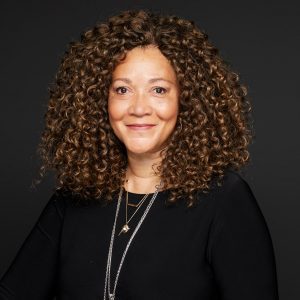
WVIK has moved the “The Power of Words” with Michele Norris (a former “All Things Considered” host) to March 10, 2022.
tapestry. Today, not so much. It’s more like a paint by numbers.”
A personal and professional turning point for Heusel came in 2010, when her 16-year-old daughter Mari died (she has two other daughters and a son), of congenital heart disease, after having had eight open-heart surgeries.
“When she passed, I think it unlocked a lot of things here for me creatively, certainly, because I used music as a way to process through my grief at the time and as a way to reach out and connect with people in a way that felt safe to me,” she said.
“I didn’t want to walk around with a grief on display all the time, and I’m kind of a personal person about that,” Heusel said. “I don’t share that stuff easily, but this sort of allowed me to do that, and in opening up more and becoming less formal — becoming more conversational, allowing more of my personality to come through. I think it paid off in that people actually did feel like they were connecting with somebody.
“I think that’s the whole reason why we’re here. I don’t think we’re sitting in here just to present music and fill time,” she said. “I think part of our mission has to be to be brave enough to reach out and connect with people that we don’t know.”
Her daughter lost the ability to walk and talk, but Heusel said music connected with Mari.
“Now looking back on it, she pushed me to be somebody better than I thought I could be and when she was in the hospital in those long periods of time — especially following the cardiac arrest — she was in comas both times after those for varying periods,” she said. “I recorded a ton of music from here that I thought would be music for healing, pieces that I thought would inspire and help rebuild synapses that had been broken in the brain.”
“I would just play these tapes constantly for her,” Heusel recalled. “I’m convinced that that was one of the things that allowed so much of her personality and her intellect to survive. I really feel that it was music helped her build back better. And she understood great music. There’s times I would play pieces and I would look over and she would just have tears streaming down her face. So I knew that the music had moved her.”
She’s used that power of music at WVIK, and her friendly personality to make every piece accessible to people. Heusel treasured a 2015 interview she did with the equally friendly Yo-Yo Ma, before he soloed with the Q-C Symphony.
“He’s probably the greatest cellist in our lifetime,” she said. “He started it off right away, because I said, ‘Hello Mr. Ma’ and he was like, no, no, no, it’s Yo-Yo, right away. That would separate me as someone awestruck of him. He didn’t want that. He wanted us to be two people just talking about music.
“I’ll be forever grateful to him for that. And I’ve seen a lot of musicians, that’s what they want to do. They, of course, they want you to admire all that they’re putting into it, because this is their job, their life’s work,” Heusel said. “But they don’t want you to put them on a pedestal. That’s part of what they’re doing, that engagement with you is kind of like what I’m talking about — making music something that’s accessible to everybody.”
WVIK has been especially valuable to many people over the past 14 months, particularly those alone at home during quarantine, who felt isolated and lonely.
“I think building that relationship probably paid off a lot, especially over this last year because I got a lot of phone calls again from our mostly, our main demographic, elderly people who are either widowed or alone in some way,” Heusel said. “They couldn’t get out and see their friends. And I was just it for them in the afternoon. I was probably the only other voice they heard for many, many days.”
“It was deeply moving — some of those people just broke down and cried and it made me realize how desperate we all are for contact with other human beings,” she said. “A big part of what’s wrong with the world right now is so many people walking around that don’t feel connected for one reason or another or they’ve tried and been rebuffed in ways they don’t understand.”
“I think music is something that’s a no-brainer; music is easy,” Heusel said. “You put it out there, it invites people to join in and they don’t have to be a music student to love it. They don’t have to be a musician or composer to marvel at the complexity of melodic lines or the horns coming in at the beginning of the 3rd movement.”
“We’re hearing the human voice sing, soar in the rafters and places nobody thought the human voice could go,” she said. “That’s the part of my job I really love, is I can hopefully extend that hand to people everywhere and say, come on in. Give a listen.”
A favorite part of her show is “Music 101,” since 2014, when Heusel has talked with composer and Augie music professor Jacob Bancks, who has a similar sense of humor and unpretentious enthusiasm for music. Since Covid, he hasn’t come into the studio, but she hopes to restart that soon. Past segments are available to hear online.
She’s also been very happy with Pearce at the station helm.
“He’s tried to move us into the 21st century, to beef up things that we probably should have had a decade or two decades ago,” Heusel said.
“I think the fact that we’ve been able to survive through all of this is probably nothing short of a miracle,” she said. “We know that most people resist change. If they’ve grown to listen to you and depend on you, that’s what they want from you. They don’t want a whole lot of that newfangled stuff and I think when you’re introducing new ideas or new technology or a new lineup, like pushing Perspective up an hour. I think if it’s done carefully and mindfully, which I do think Jay has been very good at that.”
Kai Swanson, former news editor, interim GM
Swanson — special assistant to Augustana president Steve Bahls since 2005 – has a soft spot in his heart for WVIK and is another familiar on-air voice. He’s been on the college staff since his graduation in 1986. He grew up in Rock Island, just across Lincoln Park from campus.
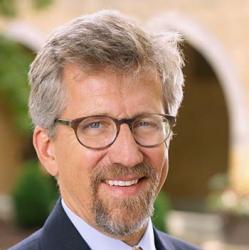
1986 Augie alum Kai Swanson has a long history with the station.
His past positions at Augustana include news editor for WVIK, public relations director, and editor of the Augustana College Magazine. In 2011, he served as WVIK interim general manager for nine months, before Pearce took over.
“What Jay has brought is stability and not stasis. A public radio station is an exceptionally delicate flower and you know when it’s properly connected, it is a thing of beauty,” Swanson said recently.
“But as we’ve seen anybody who’s followed public broadcasting, it doesn’t take much for them to wither. And in the case of having somebody like Jay, who not only knows how to make the operation solid and sustained — he also has that ability to keep an eye on the horizon and above the horizon, to keep the station growing and what he’s done during a decade in which the broader theme in public broadcasting has been consolidation.
“Look what he’s done for journalism — who’s growing a newsroom in the last decade?” Swanson asked. “And not that WVIK is unique. I don’t want to imply that, but it is certainly against the norm.”
When WVIK started, he was a junior at Rock Island High School.
“I found out in in high school that listening to Gary Burlingame and Nocturne was a great way to study. I retained more than when I was listening to ‘Bohemian Rhapsody’ on another station,” Swanson said.
“When I was a student in college, I would volunteer during fund drives over at VIK, mostly that was to curry favor with Wooten, so he’d remember in the summer when he was casting parts for Genesius Guild,” he said.
Since Swanson majored in history and German at Augie, Wooten knew he could pronounce classical music names and terms, and asked him to host a music show after college. Swanson later got hired for the newsroom, and became morning news editor.
“I did that for nine years and it was one of the best jobs you could ever hope for,” he recalled.
In the late ‘80s, WVIK hired Herb Trix (another smooth, velvet radio voice) for news, and Swanson credited Wooten for classing up the place
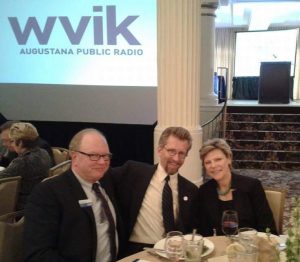
Pearce, left, with Kai Swanson and NPR’s Cokie Roberts in 2014.
that way.
“He knew how to hire people to fill in the picture and put it in the focus and Herb — if he’s not the dean of Quad-Cities broadcast journalists, I don’t know who could claim that,” Swanson said.
In the late ‘90s, he started hosting Quad City Symphony concerts and leading Concert Conversations, and WVIK has regularly rebroadcast the concerts, usually the weekend following. Swanson served as interim GM before Pearce started in fall 2011.
“There were some real serious issues confronting the station, and it was not a done deal that it would be able to be sustained,” Swanson said, noting the college had to cover several months of operating deficits.
President Steve Bahls, “while a huge and unabashed supporter of public broadcasting, kind of made it clear that, that was not something that the college can do,” he said. “The college’s mission is to provide a superior education to its students; it’s not necessarily part of its mission to run a public broadcasting operation.”
“Nobody else is doing what WVIK does — which is provide a wonderful balance of really thoughtful news coverage and serious coverage of
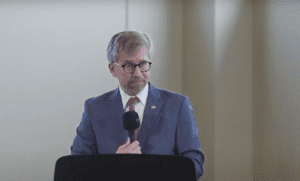
Kai Swanson
the arts and cultural scene in the Quad-Cities,” Swanson said. “I think Steve was basically making a bet that if we could get the ship righted and get the right person at the helm, that it would thrive.”
It’s also helpful for Pearce to be serving on the NPR board, he said.
“It’s following up on something that Don was very much a part of — Don got this started because he looked across the national landscape of public broadcasting and realized that, at that time we were one of the last areas unserved by its own public radio station,” Swanson said. “He jumped into a special federal program that he learned about because he was active in regional and local politics and was able to get the resources needed to get this harebrained scheme off the ground.”
Public radio does a good job of truly being fair and balanced, which is helped by removing the commercial profit motive, he said.
“It frees the operator to just do journalism, right?” he said. “I’ve heard that same criticism ever since I was a reporter. Back in the ‘80s and ‘90s I was proud of the fact that I got as many complaints saying that kid is a right-wing nut job as I heard that kid’s a left-wing nut job. So I think that’s kind of in the eye of the beholder. What is true though, is our democracy relies upon supportable journalism.”
“I think what will be the defining characteristic for successful stations like WVIK, will be the continued ability to create community,” Swanson said of groups of people tuning in at one time for music or news. “If I’m stuck on the Government Bridge and I’m listening to ‘The Moldau,’ I’m sharing that experience with a bunch of other people who live by a beautiful river – just the same way that Bedrich Smetana lived by a beautiful river a century-and-a-half ago.”
Jared Johnson, director of development and community engagement
Before coming to WVIK in 2014, Johnson served as director of marketing for the Quad City Symphony Orchestra. He started at the station as director of corporate support and marketing.
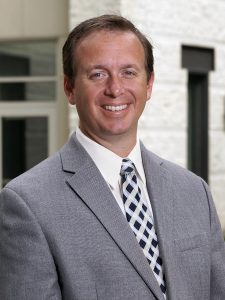
Jared Johnson is the station director of development and community engagement.
“One of the things I have enjoyed most looking back at my time has been nurturing our podcast portfolio from zero in 2015, when Sarah Gardner and I launched Radish on the Radio, to where we are today,” Johnson said. “In 2016, Lacy Scarmana, Alfredo Manteca, and Scott Reeder hit the national charts with ‘Suspect Convictions.’
“And today we have nearly 30 podcasts getting thousands of downloads each week, available on all kinds of platforms including WVIK’s app,” he said. “I am excited to continue expanding this arm of our business.”
The list of the local podcasts WVIK airs and archives online is impressive –
· Scribble
· RiverWay Stories
· Music 101
· Midwest Week
· The Great Quad Cities Listen
· Talking Art
· True Admissions
· Margins
· The Gallery Gap
· Love Girls: The Podcast
· Wellness Wake Up Call
· Good Morning from WVIK
· Perspective
· Morning Classics
· Saturday Morning Live!
· Serenade with Sunday Concerts
· APRIS
· Swing Shift
· Jazz After Hours
· RME Radio Hour
· Heartland Politics
· Charlie’s Music Shop
· Rock Island Lines
· The Cities
· A Real Piece of Work
Of the station’s $1-million annual budget (with just seven full-time staff), about 20 percent of funding comes from state and federal sources, such as the Illinois Arts Council and Corporation for Public Broadcasting, Johnson said. About 35% comes from local foundations and businesses, and the single largest pool of money is 45% that comes from individual listeners. That’s what truly makes it a “public” radio station.
To donate or for more information, visit www.wvik.org.









